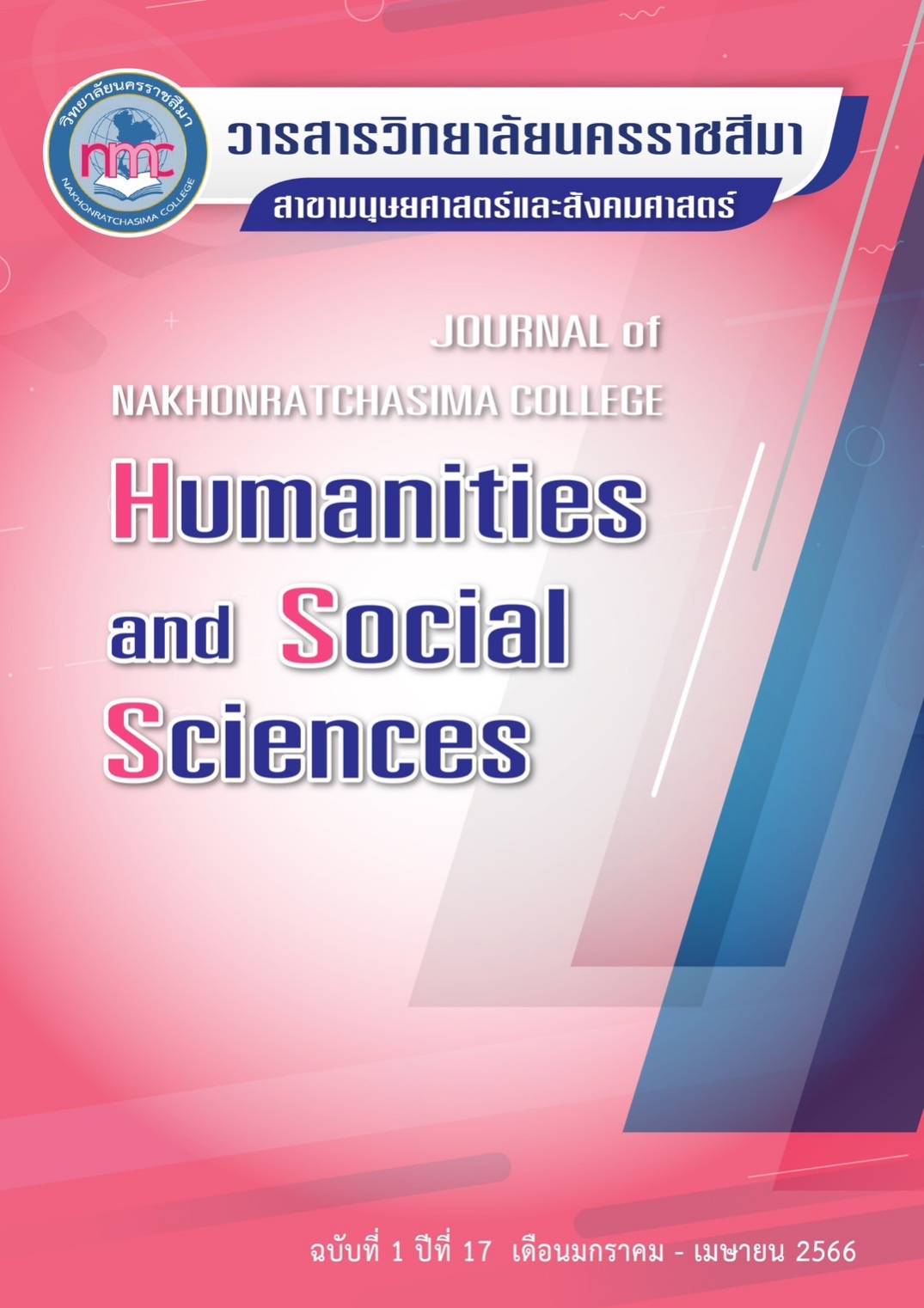ปัจจัยเชิงสาเหตุของความตั้งใจเข้าสู่อาชีพในอุตสาหกรรมการท่องที่ยวและบริการของนักศึกษาสาขาวิชาการท่องเที่ยวและบริการ มหาวิทยาลัยเทคโนโลยีราชมงคล
The Causal Factors Affecting on Future Career Intention in Tourism and Hospitality Industry of Students in the Department of Tourism and Hospitality Management Rajamangala University of Technology
คำสำคัญ:
การท่องเที่ยวและบริการ , การฝึกประสบการณ์ , ประสบการณ์การฝึกวิชาชีพ , ความตั้งใจเข้าสู่อาชีพบทคัดย่อ
การศึกษาครั้งนี้มีวัตถุประสงค์เพื่อ (1) ศึกษาระดับความคิดเห็นของความคาดหวังในการฝึกประสบการณ์วิชาชีพ ความพึงพอใจในการฝึกประสบการณ์วิชาชีพ และความตั้งใจเข้าสู่อาชีพ ของนักศึกษาสาขาวิชาการท่องเที่ยวและบริการ มหาวิทยาลัยเทคโนโลยีราชมงคล (2) ศึกษาความคาดหวังในการฝึกประสบการณ์วิชาชีพ และความพึงพอใจในการฝึกประสบการณ์วิชาชีพ ที่ส่งผลต่อความตั้งใจเข้าสู่อาชีพของนักศึกษาสาขาวิชาการท่องเที่ยวและบริการ มหาวิทยาลัยเทคโนโลยีราชมงคล และ (3) ศึกษาความคาดหวังในการฝึกประสบการณ์วิชาชีพ และประสบการณ์การฝึกวิชาชีพ ที่ส่งผลต่อความพึงพอใจต่อการฝึกประสบการณ์วิชาชีพ ของนักศึกษาสาขาวิชาการท่องเที่ยวและบริการ มหาวิทยาลัยเทคโนโลยีราชมงคล ประชากรที่ใช้ในการศึกษาครั้งนี้ คือ นักศึกษาระดับปริญญาตรี ชั้นปีที่ 4 ที่กำลังศึกษาอยู่ในหลักสูตรการท่องเที่ยวและการบริการ ของมหาวิทยาลัยเทคโนโลยีราชมงคล ทั้ง 9 แห่ง โดยคัดเลือกกลุ่มตัวอย่างที่มีผ่านการฝึกประสบการณ์วิชาชีพ จำนวน 580 ตัวอย่าง เครื่องมือที่ใช้ในการวิจัยเป็นแบบสอบถาม และวิเคราะห์ข้อมูลได้แก่ สถิติเชิงพรรณนา การวิเคราะห์องค์ประกอบเชิงยืนยัน (Confirmatory Factor Analysis: CFA) และการวิเคราะห์โมเดลสมการโครงสร้าง (Structural Equation Model analysis: SEM) เพื่อวิเคราะห์โมเดลสมการโครงสร้างเพื่อหาอิทธิพลเชิงสาเหตุของตัวแปร ผลการวิจัยพบว่า กลุ่มตัวอย่างให้ความสำคัญกับปัจจัยเชิงสาเหตุของความตั้งใจเข้าสู่อาชีพในอุตสาหกรรมการท่องเที่ยวและบริการอยู่ในระดับมากทุกปัจจัย โดยเมื่อเรียงตามลำดับพบว่า กลุ่มผู้ตอบแบบสอบถามให้ความสำคัญกับความพึงพอใจในการฝึกประสบการณ์วิชาชีพมีค่าเฉลี่ยสูงสุดเท่ากับ 3.94 รองลงมา ความตั้งใจเข้าสู่อาชีพ ( = 3.90) ประสบการณ์การฝึกประสบการณ์วิชาชีพ ( = 3.88) และความคาดหวังในการฝึกประสบการณ์วิชาชีพ ( = 3.85) ตามลำดับ การศึกษาความคาดหวังในการฝึกประสบการณ์วิชาชีพ และความพึงพอใจในการฝึกประสบการณ์วิชาชีพ ส่งผลต่อความตั้งใจเข้าสู่อาชีพของนักศึกษาสาขาวิชาการท่องเที่ยวและบริการ มหาวิทยาลัยเทคโนโลยีราชมงคล และ ศึกษาความคาดหวังในการฝึกประสบการณ์วิชาชีพ และประสบการณ์วิชาชีพส่งผลต่อความพึงพอใจในการฝึกประสบการณ์วิชาชีพ ของนักศึกษาสาขาวิชาการท่องเที่ยวและบริการ มหาวิทยาลัยเทคโนโลยีราชมงคล เมื่อทดสอบสมมติฐานพบว่าตัวแบบจำลองที่สร้างขึ้นจากการทบทวนวรรณกรรมมีความสอดคล้องกับข้อมูลเชิงประจักษ์และผ่านเกณฑ์ที่กำหนดไว้ทุกข้อโดย Chi-Square = 531.671, df = 285, Relative Chi-Square = 1.866, p-value = 0.000, RMSEA = 0.035, SRMR = 0.073, GFI=0.950, NFI = 0.927, CFI=0.964, IFI = 0.965
เอกสารอ้างอิง
กริช แรงสูงเนิน. (2554). การวิเคราะห์ปัจจัยด้วย SPSS และ AMOS เพื่อการวิจัย. กรุงเทพฯ: วี พริ้นท์ (1991).
ทรงพล วิธานวัฒนา และ ธัญปวีณ์ รัตน์พงศ์พร. (2564). “ปัจจัยที่มีผลต่อการปฏิบัติงานของผู้ประกอบอาชีพเชฟในประเทศไทย: กรอบแนวคิดความสัมพันธ์ของปัจจัยเชิงเส้นที่มีผล ต่อผลการปฏิบัติงาน.” วารสารมนุษยศาสตร์และสังคมศาสตร์ มหาวิทยาลัยราชพฤกษ์, 7(3), 1 -20
มติชนออนไลน์. (2565). ส.โรงแรม’ ชี้เสี่ยงขาดแคลนแรงงานทักษะสูง หลังโควิดทำต้องเลิก จ้างกว่า50% วอนรัฐเยียวยาผลกระทบ. [ออนไลน์]. สืบค้นจาก: https://www.matichon.co.th/economy/news_3164379. (1 กันยายน 2565).
มหาวิทยาลัยเทคโนโลยีราชมงคลล้านนา (2564). เครือข่าย 9 ‘ราชมงคล’ จับมือร่วมกันพัฒนาการศึกษาเปิดโครงการเรียนข้ามมหาวิทยาลัย – สานต่อธนาคารหน่วยดิจิทัล. [ออนไลน์]. สืบค้นจาก: https://chiangrai.rmutl.ac.th. (1 กันยายน 2565).
วิไลลักษณ์ ขาวสอาด. (2561). “ประสิทธิผลของสหกิจศึกษา: กรณีศึกษา อุดมศึกษาไทย.” วารสาร มจร. สังคมศาสตร์, 7(3), 206-218.
สถาบันวิจัยเพื่อการพัฒนาประเทศไทย (ทีดีอาร์ไอ). (2564). วิกฤติโควิด-19 ในกลุ่มเยาวชนว่างงาน-นอกการศึกษา: ปัญหาที่ยังไม่ได้รับการแก้ไขจากรัฐ. [ออนไลน์]. สืบค้นจาก: https://tdri.or.th/2021/10/the-neet-generation-at-the-age-of-covid-19/ (1 กันยายน 2565).
อดิเรก นวลศรี, ณิชาภา ยศุตมธาดา และ Wang Heng. (2560). “ปัจจัยในการเลือกอาชีพของ นักศึกษาชั้นปีที่ 4 หลักสูตรศิลปศาสตรบัณฑิต สาขาวิชาภาษาจีน มหาวิทยาลัยราชภัฎ มหาสารคาม.” วารสารช่อพะยอม, 28(1), 115 – 123.
Brown, E.A., Arendt, S.W., Bosselman, R.H. (2014). “Hospitality management graduates’ perceptions of career factor importance and career factor experience.” International Journal of Hospitality Management, 37, 58-76.
Choudhary, R. (2021). “Perception of hotel management student’s towards working in Hotel Industry.” ANVESAK. 51(1), 28-34.
Cronbach, L. J., & Furby, L. (1970). “How we should measure" change": Or should we?.” Psychological bulletin, 74(1), 68.
El-Houshy, S. (2018). “Hospitality students' perceptions towards working in hotels: A case study of the faculty of tourism and hotels in Alexandria University.” In The 6th International Scientific Conference, Faculty of Tourism and Hotels Alexandria University
Hair, J. F., Black, W. C., Babin, B. J. & Anderson, R. E. (2010). Multivariate Data Analysis (7th ed.). Upper Saddle River, NJ: Prentice Hall
Husainah, N., Hafnidar, S., & Limakrisna, N. (2022). “Determinants of Self-Efficacy to Generation Z Job Satisfaction.” Journal of Positive School Psychology, 5(6), 850-860.
Mohammed, A. A., & Rashid, B. (2016). “The moderating influence of internship program on the relationship between undergraduates’ perception and their intention to join tourism and hospitality industry: A theoretical model.” International Review of Management and Marketing, 6(2), 317-321.
Richardson, S. (2008). “Undergraduate tourism and hospitality students’ attitudes toward a career in the industry: a preliminary investigation.” Journal of Teaching in Travel & Tourism, 8(1), 23-46.
Rovinelli, R. J., & Hambleton, R. K. (1976). “On the use of content specialists in the assessment of criterion-referenced test item validity.” In Paper presented at the Annual Meeting of the American Educational Research Association (60th, San Francisco, California, April 19-23, 1976)
Samarathunga, WHMS and Dissanayake, DMMI. (2018). “School Students’ Attitude Towards the Career Intention in the Tourism Industry: The Case of North Central Province, Sri Lanka.” Journal of Management Matters, 5(2), 1-16.
Schumacker, R.E., & Lomaz, R.G. (2010). A beginner’s Guide to Structural Equation Modeling (3re ed.). New Jersey: Lawrence Erlbaum Associates.
Unguren, E., & Huseyinli, T. (2020). “The moderating effect of student club membership on the relationship between career intention in the tourism sector and post-graduate employability anxiety.” Journal of Hospitality, Leisure, Sport & Tourism Education, 27, 100265.
Wen, H., Li, X., & Kwon, J. (2019).” Undergraduate students’ attitudes toward and perceptions of hospitality careers in mainland China.” Journal of Hospitality and Tourism Education, 31(3), 159–172.
ดาวน์โหลด
เผยแพร่แล้ว
รูปแบบการอ้างอิง
ฉบับ
ประเภทบทความ
สัญญาอนุญาต
จรรยาบรรณผู้เขียนบทความ
ผู้เขียนบทความต้องรับรองว่าบทความนี้ไม่เคยตีพิมพ์ในวารสารใดหรือสิ่งพิมพ์อื่นๆ มาก่อน ต้องไม่คัดลอกผลงานผู้อื่นมาปรับแต่งเป็นบทความของตน และไม่ได้อยู่ระหว่างการเสนอเพื่อพิจารณาตีพิมพ์ อีกทั้งยอมรับหลักเกณฑ์การพิจารณาและการตรวจแก้ไขบทความต้นฉบับโดยกองบรรณาธิการวารสารวิทยาลัยนครราชสีมา สาขามนุษยศาสตร์และสังคมศาสตร์
บทความทุกเรื่องได้รับการตรวจพิจารณาทางวิชาการโดยผู้ทรงคุณวุฒิที่มีประสบการณ์และมีความเชี่ยวชาญตรงตามสาขาของบทความ ซึ่งผู้เขียนต้องแก้ไขตามคำแนะนำของผู้ทรงคุณวุฒิภายในระยะเวลาที่กำหนด หากไม่เป็นไปตามกำหนดกองบรรณาธิการขอสงวนสิทธิ์และยกเลิกการตีพิมพ์โดยจะแจ้งให้ทราบต่อไป
ข้อความที่ปรากฏในบทความของวารสารนี้เป็นความคิดเห็นของผู้เขียนซึ่งไม่เกี่ยวข้องกับวิทยาลัยนครราชสีมาแต่อย่างใด และกองบรรณาธิการขอสงวนสิทธิ์ในการพิจารณาและตรวจประเมินบทความเพื่อตีพิมพ์ในวารสารของวิทยาลัยนครราชสีมา สาขามนุษยศาสตร์และสังคมศาสตร์



